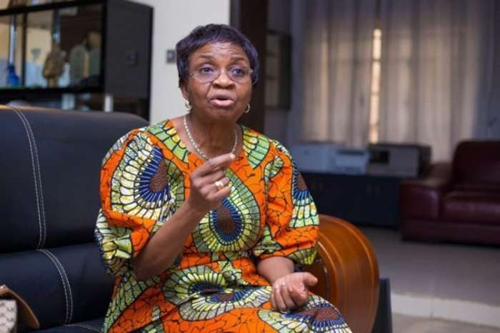By Yewande Foluke Bassey
The epic moment was heralded by jingles in the media and all other avenues of modern communication. The hype was in commemoration of the celebration of the 20th anniversary of The National Information Technology Development Agency (NITDA). Two decades of existence as the champion of IT practices, regulation and development in Nigeria. In 2001, the contribution of IT sector to the national GDP was less than 0.5% and today, according to the National Bureau of Statistics’ report, ICT leads the industry contribution with over N4trn in Q1 2021.
This is as a result of prompting an enabling ecosystem that is generating and promoting innovation and expanding job creation in the country.
On Monday April 19th at the Digital Economy Complex, the Honourable Minister of Communication and Digital Economy, Dr. Isa Ali Ibrahim Pantami, on-behalf of NITDA, launched the anniversary logo to officially commence the 2-week long celebration activities.
The Director General of NITDA Mallam Kashifu Inuwa Abdullahi CCIE in his anniversary opening speech stated that the establishment of NITDA provided the opportunity for digital transformation of Nigeria.
The anniversary lecture delivered by Professor Abdul- Hakeem Ajijola captured the journey so far for the Agency. He went down memory lane, as the President Olusegun Obasanjo administration declared IT a national priority in mid-1999.
In February 2000, a committee chaired by Mr. Tunde Ezichi (Njoku) submitted a proposed draft IT policy to the HRM Ebitimi Banigo, the Minister of the Federal Ministry of Science and Technology. This led to the production of the master plan for the development of national ICT program “ICT 2000”.
The Federal Executive Council (FEC) in March 2001 approved the final draft of the IT policy. On April 18, 2001 NITDA was established. Subsequently in 2007 the NITDA Act was passed into law by the National Assembly, which also established the National Information Technology Development Fund (NITDEF), managed by NITDA.
DIRECTOR GENERALS OF NITDA FROM INCEPTION
2001-2004: Late Professor Gabriel Olalere Ajayi
2005-2013: Professor Cleopas Officer Angaye
2014-2016: Mr Peter Olu Jack
2016-2019: Dr Isa Ali Ibrahim Pantami
2019- Till date Mr Kashifu Inuwa Abdullahi
EFFORTS OF DIRECTOR GENERALS
Between 2008 – 2016, several committees worked on the review of the National IT Policy but none of the efforts received approval.
Under the leadership of Dr Isa Ali Ibrahim (Pantami) as the Director General of NITDA, the Agency was able to obtain the International Organization for Standardization/International Electrotechnical Commission (ISO/IEC) 27001 certification. In January 2019 Dr Pantami also published the Nigeria Data Protection Regulation (NDPR), a significant regulation for the IT ecosystem.
In pursuit of the actualization of the National IT policy goal to digitize Nigeria, on October 23, 2019, President Muhammadu Buhari GCFR approved the redesignation of the Ministry of Communications under whose purview NITDA operates to Federal Ministry of Communications and Digital Economy (FMoCDE), this was closely followed by the unveiling of the National Digital Economy Policy and Strategy (NDEPS) in November 2019, to enhance the transformation of Nigeria into a digital economy.
Mallam Abdullahi, the incumbent Director General of NITDA, has ensured the continuous implementation and secured a supplementary regulation to strengthen the NDPR.
ANNIVERSARY ACTIVITIES
The Agency with the mandate for a digital Nigeria, organized the Creativity and Innovation Challenge to promote indigenous content. The event took place on Wednesday 21st April at the Agency’s National Centre for Artificial Intelligence and Robotics (NCAIR), in Abuja.
Five startups won N2 million each emerging from 800 participants that contested from the 36 states and the Federal Capital Territory (FCT). The winners are, Nwachinemere Emeka from Ibadan who invented Kitovu Technology Company to assist farmers, Muhammad Banre from Kaduna who invented Scholar Limited, a learning app, Jeremiah Kuro from Port Harcourt who invented Bliu-I Automation Limited an automative App, Ajiboye Mayowa from Port Harcourt who invented another learning App called CAPSULE.
The Director General of NITDA attributed the idea of introducing the innovative challenge as a tool for the implementation of the NDEPS pillars namely: Developmental Regulation; Digital Literacy and Skills; Soft Infrastructure; Service Infrastructure; Digital Services Development and Promotion; Soft Infrastructure; Digital Society and Emerging Technologies; and Indigenous Content Promotion and Adoption.
A webinar series with the theme; Secure e-Government, Cyber Risk and Cyber Securities respectively, were conducted in collaboration with Digital Jewels.
At the webinar sessions, Dr Isa Ali Ibrahim Pantami stated that e-Government will be a blessing to all Nigerians when fully implemented, adding that President Muhammadu Buhari led administration is very passionate about the implementation of National e-Government master plan.
The Minister asserted that virtual engagements are now formal and institutionalized form of engagements in Nigeria noting that at the ministerial level in Nigeria, focus is more on National Policy development and Policy supervision.
He explained his efforts in acquiring the approval for the development of the first ever NDPR to give confidence to the citizens to ensure that any data under the government is secured.
Dr Pantami mentioned that series of eGovernment trainings have been organized where public and civil servants were trained on eGovernment.
Recently the President had unveiled the National Cybersecurity Policy, and awareness is being created to all citizens on how to cautiously navigate the internet, which is a foundational strategy for eGovernment.
However, it was established by speakers at the webinar that Cybersecurity is identified as a pillar which is very essential for Digital Economy and Digital Transformation within the government.
As part of the anniversary celebration NITDA also unveiled the Agency’s Strategic Road Map and Action Plan 2021-2024(SRAP), a turning point for the Agency on digitalization of Nigeria. The NITDA DG at the occasion noted that the SRAP is anchored on seven strategic pillars namely, Developmental Regulations, Digital Literacy and skills, Digital Transformation, Digital Innovation and Entrepreneurship, Cybersecurity, Emerging Technologies, Promotion of Indigenous Content.
SOME OF NITDA’S ACHIEVEMENTS FROM YEAR 2001-2021
- 1764 Digital Community Centres established across the country.
- Impacted over 2.5 million Nigerians directly or indirectly in terms of developmental interventions (IT trainings, IT infrastructures and tools).
- Over 2,686 jobs created through licensing of 72 DPCOs.
- 65 billion naira was saved through IT clearance.
- Established 8 IT Hubs across six geopolitical zones.
- 4 IT Incubation Park across the country.
- 23 Virtual Libraries in higher institutions of learning across the country.
- Re-branding the Agency in line with NDEPS vision.
- Forging National and International Collaboration and Partnership with critical stakeholders.
- Establishment National Centre for Artificial Intelligence and Robotics (NCAIR) and
- Commencement of the Development of the National Digital Innovation and Entrepreneurship Centre.
SOME REGULATORY INSTRUMENTS ISSUED ARE:
- The Rule-making Process Regulation of NITDA
- The Nigerian Data Protection Regulation
- Guideline for the Clearance of Information Technology Projects in Federal Public Institutions
- Guidelines for Public Internet Access
- Framework for the use of social media in Public Institution
- Guidelines for Nigerian Content Development in Information and Communications Technology as amended
- Nigeria e-Government Interoperability Framework (Ne-GIF)
- Nigeria ICT Innovation and Entrepreneurship Vision (NIIEV)
- Nigeria Cloud Computing Policy; and
- Framework and Guidelines for ICT Adoption in Tertiary Institution.
The regulations were innovative with the assurances that there is a secure digital service in creating an industry for our country. Data is the greatest resource in the digital economy.
With these achievements and regulatory instruments in place, NITDA is focusing its diverse mandates to foster the development and growth of IT in Nigeria through monitoring, evaluating, and verifying projects under the supervision and coordination of the Federal Ministry of Communications and Digital Economy.





























